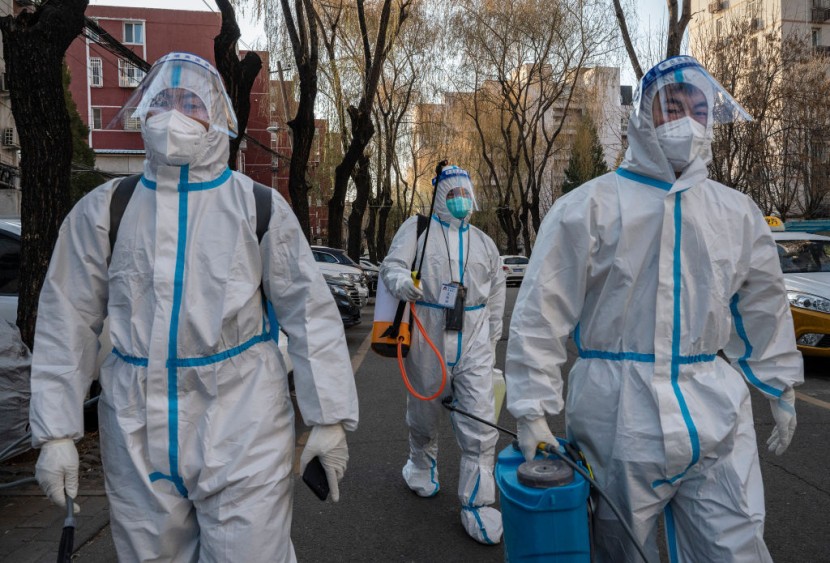
Many Chinese people applaud a relaxation of COVID-19 restrictions that have crippled enterprises and fueled unemployment. However, protestors seized by China's security forces worry about their future.
Human rights lawyers and professors point out President Xi Jinping's rigid approach to dissent during the last decade and warn that protestors still face dangers of harassment and punishment after their release with a warning, Reuters reported.
According to Lynette Ong, a lecturer at the University of Toronto, "Squaring the accounts after the fall harvests" is how the Communist Party deals with those who have "betrayed" it.
An earlier report stated that protesters in the Beijing rallies over COVID-19 restrictions have started to be investigated by Chinese authorities.
When asked what legislation they would employ to suppress protests in China, the Ministry of Public Security did not provide any information.
Last week, China announced that it will tighten on "hostile forces' infiltration and sabotage" efforts, and will not accept any "illegal and criminal actions that disturb social order," as per the Communist Party's top body in charge of law enforcement agencies. However, the recent China protests were not mentioned.
When asked about the demonstrations, the Chinese foreign ministry has stressed that individual liberties and rights must be exercised legitimately.
A substantial police presence on the streets caused the China protests, which were generally believed to be the turning moment for loosening the rigorous COVID-19 limitations.
Under the administration of Xi Jinping, the Ministry of Public Security issued rules that local authorities have used to exclude protestors from working as tour guides or insurance brokers and make it tougher for their family members to land jobs in the Chinese government.
The severity of the penalty for demonstrating in China varies greatly, according to Zhang Dongshuo, a Beijing-based attorney who has previously handled cases involving human rights.
Bystanders may be fined and detained for up to 15 days, while those who fight the police may be jailed for disturbing public order or "picking quarrels" and causing chaos.
Those who yelled slogans calling for the removal of President Xi Jinping or the Chinese Communist Party - as witnessed in some rallies around China - might face harsh charges of instigating or participating in the subversion of the state, Zhang added, which in the most severe circumstances carry a penalty of up to lifetime incarceration.
Chinese Abroad Join Protests Against Xi's 'zero COVID' Strategy
But aside from streets of cities in mainland China, foreign countries have also seen protests; Chinese students, for instance, organized vigils to remember those who died in a horrific fire in the region of Xinjiang late last month.
Protesters have also engaged in quiet protests to make their opposition to the zero-COVID policies known, per a DW story. To commemorate the victims of the Urumqi fire, Sid, a Chinese student at Oxford University, and his fellow Chinese students organized a series of activities, the first of which was a candlelight vigil from November 27 to December 2. The news about the event spread over Instagram, Twitter, and other platforms.
Sid sees social media's crucial function to maintaining the momentum of this multinational movement, especially in light of the increasing number of solidarity activities on college campuses throughout the globe despite the strict censorship system in China.
China Struggles in Managing Infections
In other related updates, COVID-19 outbreaks were reported in schools and companies throughout China on Friday, after the governing Communist Party relaxed anti-virus regulations to manage the country's worsening economic downturn, according to AP News.
While government statistics indicated a decline in new cases, that data no longer includes a sizable portion of the population since obligatory testing was halted on Wednesday.
That was a part of the radical shifts made to progressively end the "zero COVID" restrictions that have kept millions of people inside their homes, provoked demonstrations, and led to calls for President Xi Jinping to step down.
Beijing waitress Gang Xueping lamented that there are relatively few customers coming to their restaurant in recent weeks. She believes that a lot of adjustments must be done.
On November 11, after pledging to lessen the expense and inconvenience, the Xi Jinping administration started to relax restrictions. In an indication of waning demand, November imports fell 10.9% from the same month a year earlier. In October, automobile sales plunged by 26.5%.
According to research by Eurasia Group, relaxing COVID regulations would lead to more outbreaks. The authors of the report, Neil Thomas and Laura Gloudeman, noted that "Beijing is unlikely to return to the extended blanket lockdowns that crashed the economy earlier this year."
Related Article: Iran Protests: Global Outrage Sparks After Country Carries Out First Execution by Hanging Over Protester








